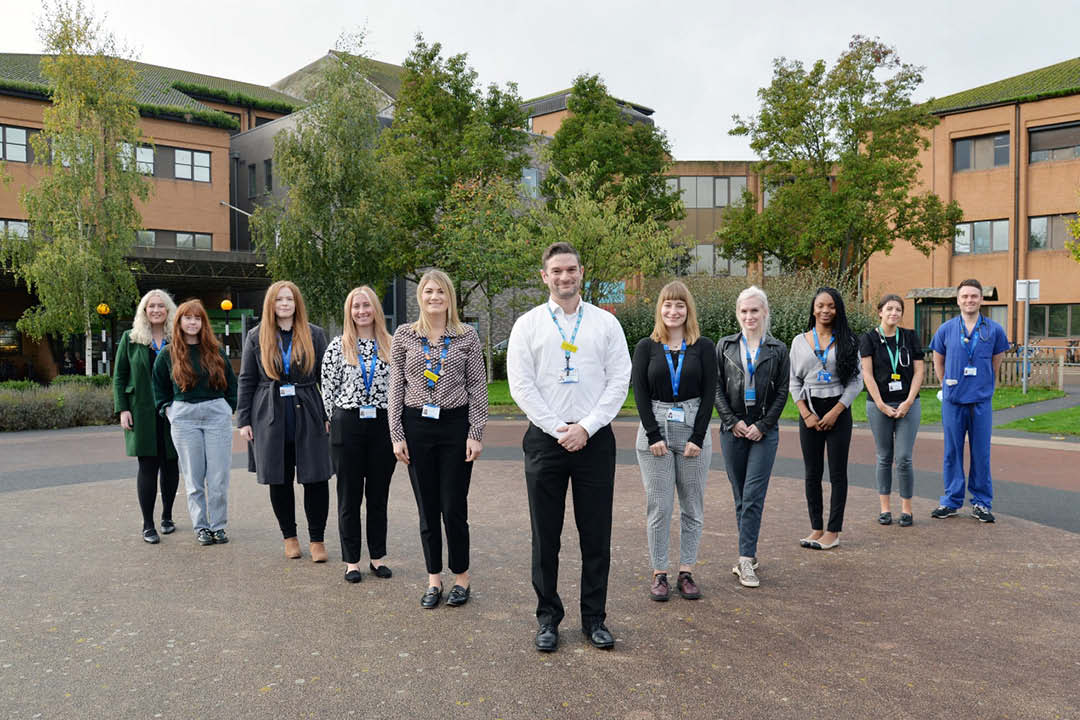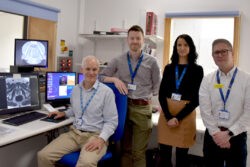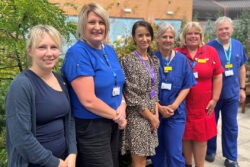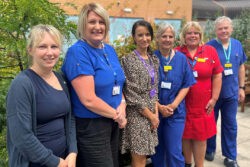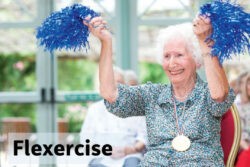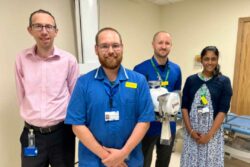A unique role that aims to ease the pressure on postgraduate doctors in training is growing from strength to strength in Somerset.
A 23 strong team of physician associates (PAs) are playing a vital role on the wards at Yeovil and Musgrove Park hospitals, taking on many jobs that free up postgraduate doctors’ time.
Physician associates have already been well-established at Yeovil Hospital for many years – it was one of the first hospitals in the south west to take on the role – and it’s now being spread across the rest of the county, including a rotation to non-hospital services in the future.
Yeovil Hospital has 11 physician associates, with another three set to join in the next few months, and Musgrove Park Hospital has 12.
They currently work across a large range of specialties, including acute medicine, care of the elderly, respiratory, emergency department, paediatrics, cardiology, endocrinology, haematology, trauma surgery, stroke, gastroenterology and general surgery.
Dr Daniel Shuttleworth, a consultant anaesthetist and a physician associate tutor at Musgrove Park Hospital, said:
“For the NHS to succeed we need to create a more diverse workforce, and this means we must look beyond the traditional way of how we staff our wards.
“This physician associate role has been in place at Musgrove for four years and includes three senior physician associates, one of whom has been appointed as our lead physician associate last year.
“In November 2021, a further three physician associates joined as part of a three year rotation though different ward specialities, and in November 2022, they were joined by another six – so we’re up to 12 in total at Musgrove.
“Most of our physician associates tend to be science graduates who progress to take a Masters degree in a relevant field, through the University of West of England, so they have all the tools they need to make a real impact in the NHS.
“While it’s not a medical degree as such, it often takes place alongside medical students so there’s plenty of crossover.”
Colleagues across the NHS are being stretched more than ever with increasing numbers of patients, especially those with complex conditions, and this is inevitably having an impact on our team of postgraduate doctors in training.
“The increase in patients we’re seeing isn’t matched by an increase in postgraduate doctors,” Daniel continued. “Our team of physician associates are now playing a vital role in looking after patients across Musgrove Park and Yeovil hospitals.
“There are some aspects of care and treatment that don’t currently fall under the remit of our physician associates, such as prescribing or the ordering of ionising radiation, but there is so much more that can be shared out them.”
“While our postgraduate doctors have traditionally carried out these type of tasks, we need to increase the number of colleagues across different professions that can share this type of workload, freeing up more time for our doctors to concentrate on the medical aspects of their job, as well as their core training.
“The expectation is that over time, all our physician associates will take up permanent roles in ward areas, where they can build up their level of practice in even further depth.
“Our physician associates form a key part of the wider postgraduate in training doctor team, with who they work closely with and decide how the workload could be shared appropriately.
“There will always be some aspects of care and treatment that don’t fall under the remit of our physician associates, such as prescribing or the ordering of ionising radiation, but there is so much more that can be shared out them.
“The physician associates also provide continuity on the wards as they rotate out of sequence with our postgraduate doctors so there won’t ever be a situation where groups of doctors and physician associates stop working on the ward at the same time.”
Emma Higgie, the lead physician associate at Musgrove Park Hospital, added: “As a student physician associate, I was fortunate to have early exposure to the speciality of acute medicine.
“I really enjoyed how this area of medicine involved caring for patients who had yet to be diagnosed, and how I was able to use a combination of practical and clinical skills. This including investigations and examination to identify what was wrong with the patient and to create a treatment plan for their condition.
“I completed my physician associate training at Liverpool University between 2016 and 2018, but as I’m originally from the south west – a Musgrove baby – I was keen to move back closer to home.
“Six months prior to completing the course, I got in touch with Somerset FT to discuss the potential for a physician associate role at the trust and I was fortunate enough to later be invited to interview for the role and get offered a job.
“Despite an initial steep learning curve, the past four and a half years at Somerset FT have been really rewarding. Colleagues in our senior team in acute medicine have been supportive and encouraging to the growth and development of my role and I’ve been given so many opportunities to develop more advanced skills and build on my knowledge.
“In my lead physician associate role, I work closely with the faculty team, host forums, attend our development group meetings, and I’ve set up weekly teaching sessions with support from our registrars, using a combination of simulation and interactive workshops.
“The current rotational physician associates all joined the trust as students, and it has been fantastic to see their individual growth and development as they completed their training and stepped up to working as qualified physician associates.”
